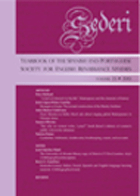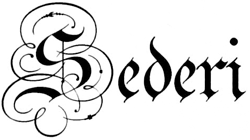
Sederi 23
Sederi 23 — 2013
EDITORS
Berta Cano Echevarría & Ana Sáez-Hidalgo
REVIEW EDITOR
Francisco J. Borge López
ISSN 1135-7789
Rocío G. Sumillera, “Sixteenth-Century Italian, French, Spanish and English Language Learning Material. A Bibliographical Study.” SEDERI 23 (2013): 139-158.
DOI: https://doi.org/10.34136/sederi.2013.7 Download PDF
Abstract
This bibliographical study offers a list of the first printed language manuals in Western Europe expressly designed to teach a particular foreign language to speakers of a particular tongue. Hence, the study lists references to sixteenth-century grammars, dictionaries and language handbooks with the possible linguistic combinations of Italian, French, Spanish and English, the first three being the most popular modern languages in sixteenth-century Western Europe and hence the most representative ones offering an insight into the foreign language learning map of the time. The bibliographical study is preceded by an introduction to the manner in which foreign tongues were taught and learned in the early modern period, and is completed by a selection of references to secondary sources that have been researched on each linguistic combination.
Keywords: Early modern language manuals; sixteenth-century grammars; sixteenth-century dictionaries.
References
Bischoff, Bernhard 1961. “The Study of Foreign Languages in the Middle Ages.” Speculum 2/36: 209-224.
Bourland, Caroline B. 1933. “The Spanish Schoole-Master and the Polyglot Derivatives of Noël de Berlaimont’s Vocabulare.” Revue Hispanique: Recueil Consacré á l’Étude des Langues, des Littératures et de l’Histoire des Pays Castillans, Catalans et Portugais 1/81: 283-318.
Bourland, Caroline B. 1938. “Algo sobre Gabriel Meurier: Maestro de Español de Amberes (1521-1597?).” Hispanic Review 2/6: 139-152.
Brefeld, Josephine 1994. A Guidebook for the Jerusalem Pilgrimage in the Late Middle Ages. Hilversum: Verloren.
Burke, Peter 2004. Languages and Communities in Early Modern Europe. Cambridge: Cambridge University Press.
Caravolas, Jean-Antoine 1994. La didactique des langues. Précis d’histoire I: 1450-1700. Montréal: Presses de L’Université de Montréal & Tübingen: G. Narr.
Cardim, Luis 1922. Some Notes on the Portuguese-English and English-Portuguese Grammars to 1830. Porto: Tipografia de “A Tribuna.”
Fontainas, Jean Peeters 1965. Bibliographie des impressions espagnoles des Pays-Bas méridionaux. Nieuwkoop: B. de Graaf.
Hüllen, Werner 2001. “Reflections on Language in the Renaissance.” Eds. Martin Haspelmath et al. Language Typology and Language Universals. An International Handbook. Berlin: Walter de Gruyter: 210-222.
Jekel De Jongh, William Frederick 1949. Western Language Manuals of the Renaissance. Albuquerque: University of New Mexico Press.
Kibbee, Douglas A. 2000. “Language Instruction for Western European Travelers.” Eds. John Block Friedman et al. Trade, Travel, and Exploration in the Middle Ages: An Encyclopedia. New York-London: Garland: 330-331.
Labarre, Albert 1975. Bibliographie du Dictionnaire d’Ambrogio Calepino 1502-1779. Baden-Baden: Valentin Koerner.
Maclean, Ian 2009. “English Books on the Continent, 1570-1630.” Learning and the Market Place: Essays in the History of the Early Modern Book. Leiden-Boston: Brill: 339-370.
Penzl, Herbert 1984. “‘Gimer min ros’: How German Was Taught in the Ninth and Eleventh Centuries.” The German Quarterly 3/57: 392-401.
Roldán Pérez, Antonio and José Miguel Hernández Terrés 2002. “Labor editora de Bartolomé Gravio.” Eds. Miguel Ángel Esparza Torres et al. Actas del III Congreso Internacional de la Sociedad Española de Historiografía Lingüística. Hamburg: Helmut Buske Verlag: 415-430.
Simonini Jr., R. C. 1951. “The Genesis of Modern Foreign Language Teaching.” The Modern Language Journal 3/35: 179-186.
Stein, Gabriele 1988. “The Emerging Role of English in the Dictionaries of Renaissance Europe.” Folia Lingüistica Historica 9: 29-138.
Suárez Gómez, Gonzalo 2008. La enseñanza del francés en España hasta 1850: ¿Con qué libros aprendían francés los españoles? Barcelona: PPU.
